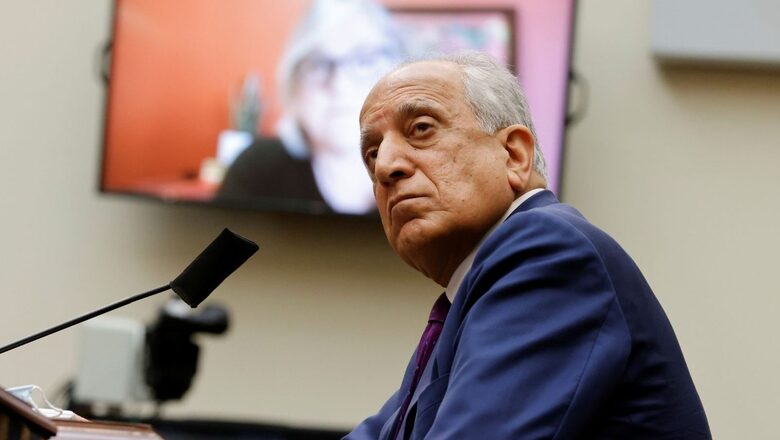
views
US Secretary of State Antony J. Blinken wanted to replace special envoy Zalmay Khalilzad for peace talks and Afghanistan reconciliation hours before the Taliban’s forced takeover in Kabul, sources privy to the conversation said on the condition of anonymity. This was stated in the last phone call between Blinken and former Afghan President Ashraf Ghani on August 14.
“In the last call with President Ghani, Blinken told him that Salman Ahmed was to lead the peace efforts. There was no mention of Zalmay Khalilzad,” the source said. The plan, however, was derailed after the Taliban decided to enter Kabul and stage a coup that led to Ghani’s escape to “prevent mass bloodshed and killings” in the Afghan capital.
Salman Ahmed is a Pakistani-American who is currently the Director of Policy Planning in the Biden Administration advising on national security and foreign policy aspects at the US State Department. Ahmed was even dispatched to Doha during the Taliban takeover to assist Khalilzad with the negotiations around mid-August. Ahmed was earlier part of Obama’s National Security Council and has served at the United Nations focused on peace process.
There had been an increasing level of frustration with Khalilzad, at the White House, who was a Trump appointee, since the killings and explosions in Kabul didn’t end and the Taliban was going back on its commitments. In the days after the fall of Kabul, Khalilzad has been criticised for offering false commitments for peace and power sharing on behalf of the Taliban. Khalilzad also had no credibility left with the Ghani-led Afghan government.
“On August 14, Blinken had called Ghani about the Afghan delegation that was sent to Qatar with a new deal that would eventually pave the way for government transfer to the Taliban. This was a balanced approach that could help the Ghani side have a fair share in the Taliban government,” the source revealed.
“At this point it was revealed that Blinken would replace Zalmay Khalilzad with Salman Ahmed. But practically it didn’t work because on August 15 the Taliban were moving inside Kabul at gunpoint which left Ghani with no choice but to leave,” the source further said.
A statement from US State Department Spokesperson Ned Price, however, on August 14 had read: “Secretary of State Antony J. Blinken spoke today with President of the Islamic Republic of Afghanistan Ashraf Ghani about developments in Afghanistan. They discussed the urgency of ongoing diplomatic and political efforts to reduce the violence. The Secretary emphasized the United States’ commitment to a strong diplomatic and security relationship with the Government of Afghanistan and our continuing support for the people of Afghanistan.”
Ambassador Khalilzad has served as US Permanent Representative to the United Nations 2007-2009, Ambassador to Iraq 2005-2007, and Ambassador to Afghanistan from 2003 to 2005.
Senior Afghan diplomat and Afghanistan’s Ambassador to Sri Lanka Ambassador Ashraf Haidari believes Ambassador Khalilzad was tasked to talk to the Taliban and exclude the Islamic Republic of Afghanistan to achieve the presidential goal tied to the US electoral politics.
“He did exactly that through a deliberate coercive mediation process that increasingly tilted the balance of power in favour of Taliban against Afghanistan’s developing democracy,” says Haidari.
“One key example”, as per Haidari, “includes the release of over 5,500 Taliban prisoners as an unprecedented concession in the recent history of conflict resolution, which the Islamic Republic was pressured into making for the sake of peace but only getting a massive escalation of terrorist attacks across Afghanistan in return.”
“Ambassador Khalilzad actively manipulated Afghans, promising them, ‘nothing is agreed until everything is agreed’. Indeed, at the end, the suffering people of Afghanistan have ended up with state and economic collapse, facing a catastrophic humanitarian crisis. One of the tragedies of this century!” says Haidari who is one of few vocal envoys of the erstwhile Afghan government.
Ambassador Amar Sinha who was India’s envoy to Afghanistan and one of the two representatives from New Delhi for the Moscow talks in 2018 that included Taliban feels that changing Ambassador Khalilzad in August was too late in the day for any course correction.
“By then Taliban had momentum on the ground and nothing to stop them in their tracks once logistical support to the ANDSF was withdrawn. When the US government decided to continue with him when the review was announced the signal was clear. No one expected the architect of a deal to now turn around and rectify the infirmities,” says Sinha.
“His immense faith in the verbal assurances provided by the Taliban and Pakistan’s rhetoric proved fatal for the future of Afghanistan. He also created a curious group of countries to help him achieve a peace deal — with each of those interested at some level in US failure,” he says.
“However”, cautions Sinha, “we have still not seen the two ‘secret’ annexures of the Doha deal — and may be therein lies his redemption. His only defence is that he was guided by the Presidential mandate he had received and delivered what the USG desired — costs to Afghans be damned.”
US State Department, Ambassador Zalmay Khalilzad and President Ashraf Ghani have been approached for a comment. US State Department has also been requested to provide the transcript of Blinken-Ghani phone call on August 14. A response is awaited.
Read all the Latest News , Breaking News and Ukraine-Russia War Live Updates here.




















Comments
0 comment